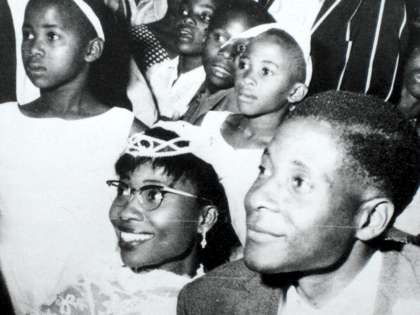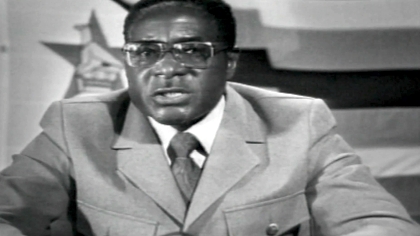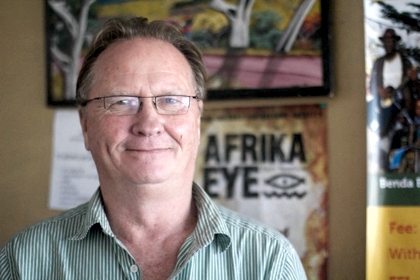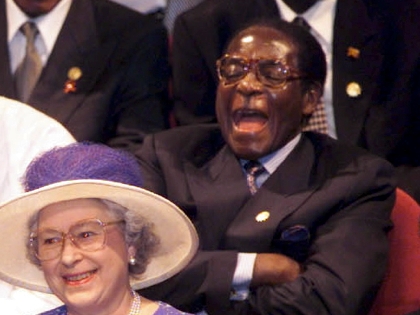Interview
The great dictator: Simon Bright on Mugabe, mobs and moral defiance

Zimbabwean activist Simon Bright risked imprisonment and torture to make Robert Mugabe… What Happened?. He tells Tom Harrad about filming post-colonial corruption from the inside
Arrests, surveillance, militias and imprisonment – making an anti-government documentary in Zimbabwe is no easy task. Yet Simon Bright, Zimbabwean filmmaker and activist-in-exile, dealt with all that and more during the making of Robert Mugabe…What Happened?.
Though presented as a chronological documentary, detailing Mugabe’s descent from liberating African hero to brutal, tyrannical dictator, the film is also an anthropological study, guerrilla protest film, celebration of indigenous culture and semi-autobiography. It’s the story of Mugabe’s political career told through exclusive archive footage and a series of frank interviews with his former colleagues and supporters, many of whom risk political retribution or even imprisonment simply by appearing in the film.
Bright himself grew up a member of the white population in what was then Rhodesia and is now Zimbabwe, and has a tumultuous relationship with his native country. I went to talk to him at his home in Bristol.
The film opens on the medieval ruins of Monomotapa, Great Zimbabwe. Do these shots reference the cycle of politics – the change and decay of civilisations?
There’s definitely a cycle or a continuity of violence in Zimbabwe, dating back to the legislative and repressive apparatus of Ian Smith [the last colonial prime minister] in Rhodesia, which Mugabe – when it suits him, when he needs to, when his power base is threatened – revives and uses again. There’s that feeling of plus ça change, where Mugabe in a sense perfects some of the earlier oppression of Smith and Rhodesia.
But the reference to the stone ruins… I grew up on a farm right near Monomotapa. And strangely enough my grandfather is reputed by the local chiefs to be one of the spirits that walk around in that place. So when I refer in the film to our ancestors, it’s that they would be horrified to see what’s going on in their country today. The film shows how in the 1980s Zimbabwe became great again – and how that was again destroyed.
Were you in Zimbabwe when British rule ended?
No. I went to school in Rhodesia and we were quite an activist family. My mother, in particular, opposed Ian Smith and white rule, taught in a black school and was connected to some of the black nationalist leaders. So under Smith we became victims of police attention and my family and I had to leave the country in 1968.
When Mugabe came to power in 1980, he enabled me to go home and I worked for his government, on his programme of rural development, making training videos and radio programmes. So that archive footage is stuff that I filmed at the time.

I understand it was difficult to shoot any new footage in Zimbabwe?
There’s a 20-year prison sentence for bringing into disrepute the president, members of the armed forces or the government – basically anyone in the regime. That’s the risk we faced making the film, and I did it under the counter – I didn’t apply for permission. I just kept a very low profile when I was in the country, using extreme security precautions.
Much of the critical tone of the film comes through interviews. Were those interviewees at risk too?
The people we interviewed who remain in the country, who spoke out, are very brave and determined. They wanted to speak up. The old man, Tekere, was in prison with Mugabe for ten years in the 1970s. He became Mugabe’s party’s first Secretary General when it came to power. So these are people who know him pretty well. But I guess at a certain stage people just decide, “We’re going to speak up.”
Some of the things that are said, when you know how dangerous it is, are very striking.
What I came to realise through the interview process is that freedom of speech is never given to a population; it’s still being fought for. Even in the UK it’s a constant struggle, you know? So those people saying what they say is their contribution, and me making the film is mine, and showing the film in Zimbabwe is another. The journalists, the newspaper editors in Zimbabwe who get arrested all the time – they’re part of a process. If you’re the editor of an opposition newspaper in Zimbabwe you’ve got to expect to spend time in prison as a way of softening you up. People are still trying to tell the truth and this film is part of that.
Mugabe’s name is recognised all over the world, he’s famous, and that gives him power. That’s one of the main reasons I made the film – to show people in the West that it’s much more complex than most of the Western media has been painting it. It’s not just black and white or black versus white. I show Freedom Fighters who vehemently oppose Mugabe and whites who served or still serve with him in Government. Extremes of black or white only serve dictators or racists.

Simon Bright
I also made it to show Mugabe supporters in Africa and the African diaspora that it’s much more complex than Mugabe’s been painting it. For Mugabe, anyone who opposes him is a tool of the whites and of Western imperialism, so any opposition is damned as selling out the cause. He sold this notion very effectively to the surrounding states of the Southern African Development Community. At the end of my film Eleanor Sissulu makes that point very clearly when she says, “those people in the African diaspora do not understand the cost to the Zimbabwean people of Mugabe’s rule.”
You say you were arrested there before. Had you been making another film?
I was arrested in 2004, but for something I hadn’t done. They knew my views and thought I was making a film for [the BBC’s] Panorama about youth militias, Mugabe’s storm troopers, which still operate now. They’re sort of unemployed youths who get trained in methods of violence and become the eyes and ears of the party throughout the countryside, and a very cheap vigilante solution for Mugabe – they’re indoctrinated, effectively. As it happens, I was making a film about a game park – about the most innocuous subject possible!
What was being locked up there like?
Well, I had no idea when I would get out; you don’t know what’s going to happen. Some people have been imprisoned for years. A lot of MDC people have been killed. There’ve been two attempts on Morgan Tsvangirai’s life, and he’s the prime minister in the current government of national unity. He won the presidential election that Mugabe ignored.
Obviously you couldn’t have interviewed anyone now working for Mugabe, or supporting him, as that would have given the game away.
The film doesn’t pretend… I didn’t set forth to create an objective and balanced documentary, as such. I wanted to tell the story of how Mugabe has changed through people who’ve known him well.
His actions are a catalogue of what he’s become. Take the footage where he says, “The pen is not mightier than the sword.” You know: if you think that by putting a cross on a piece of paper with a pen, you can get rid of me who came to power through a sword (or a machine gun), then think again. He said that to the people in his own heartland, when they refused to vote for his ZANU-PF in 2008. He then unleashed a wave of terror against his own supporters for voting for the opposition. That’s a chilling moment.

One interviewee says, “You know that whatever he is now, the evidence of his early action alone shows that at one time, he did stand for something good.”
That’s Lovemore Madhuku, head of the National Constitutional Assembly – and he’s been terribly beaten by Mugabe, so it’s astonishing that he can even say that. Some interviewees in the film have been beaten so badly on their buttocks that they actually find it difficult to sit still, and when they talk about the violence they actually become physically discomforted. Lovemore’s one of them. He’s spent a lot of time in prison. Remember that scene where the police are just casually beating all those people who are lying down? That’s in the main park in the centre of Harare. Lovemore was part of that.
The film is an insider’s view of Zimbabwean history, which has never been told like this before. I did find that hero-worship of Mugabe very difficult to give up. In a sense making the film was a way purging myself, but because that period 1980-90 was so concentrated and energetic and rich, it was difficult to let of go of it and come to terms with what Zimbabwe’s become.
‘Robert Mugabe… What Happened?’ is currently touring cinemas around the UK. See mugabemovie.com.
See also
History in the making: Ali Jafaar on the filming of Black Gold (February 2012)
Invictus reviewed by Michael Atkinson (February 2010)
Downfall reviewed by Richard Falcon (May 2005)
The Man Who Drove With Mandela reviewed by Kieron Corless (August 1999)
